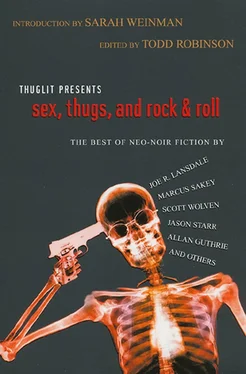Cujo was waiting in the alley.
He looked down and smiled, his lids heavy. “Go fetch old Cujo a bucket of KFC and bring it back to your place.” He glanced at Angel with a hungry moan, and she leered back. “We’ll take it in the kiddie pool.”
Bill Gurevich’s first parolee of the day was a tier-one mope named Sheldon. Sheldon was fifty-seven, a weepy ex-middle school band teacher and statutory rapist.
Gurevich was forty-nine, a retired Los Angeles County Sheriff’s deputy. He ran the sex offender detail at the California Board of Pardon and Parole’s Van Nuys office, where he presided over eighty or ninety of these court-mandated interviews every week.
The ex-felons he supervised had been locked down for offenses ranging in severity from weenie wagging in the park to tossing a ten-month-old infant out of the window of a municipal bus.
Gurevich checked Sheldon’s pay stubs to make sure he was showing up regularly for his new job at the car wash.
Sheldon was afraid of the other parolees, so Gurevich walked him out through a waiting room full of fidgeting excons, and down the hall to the elevators.
On the way back, he stopped at the check-in counter and rapped his knuckles on the bulletproof partition. Tasha the receptionist looked up from her magazine.
“I’ve got a citizen coming to see me today, a Mrs. Sheila Halpert,” Gurevich said. “Be extra nice to her and call me the second she gets here, okay?”
Tasha shrugged, disengaging the electronic security door. Gurevich returned to his cubicle, got his electric razor out of his desk, and gave himself a quick once-over. He wasn’t looking forward to sitting across a desk from Sheila Halpert. One of his new parolees had abducted and raped her daughter.
Gurevich accessed the Department of Corrections database, calling up Richard Lencheski’s prison records and psychiatric reports.
Lencheski was a tier-two offender, released after doing a dime, first at Camarillo, then at San Luis Obispo.
He was six weeks out of the halfway house, still under full electronic surveillance. A vocational training course behind the walls had earned Lencheski his current, real world job as a baker’s helper. The parolee had been fully compliant since his release date, at least on paper.
Ten years ago, Lencheski had accosted the Halpert girl at a Panorama City playground, feeding her a crushed ice drink laced with codeine cough syrup before he abducted her in his camper truck. Several hours later, when he dropped her off at a bus stop, his nine-year-old victim was catatonic, with deep fingernail scratches and bite marks.
Gurevich looked at Lencheski’s prison ID photo. The guy was one of the rare sex offenders who looked the part, with fish-belly white jailhouse skin and scraggly, untrimmed eyebrows that reminded Gurevich of ticking oozing out of a flophouse mattress.
Gurevich glanced up from his computer monitor, startled, as the security lock buzzed someone through.
Thanks a bunch for the heads-up, Tasha , he thought.
He slipped on his jacket and stepped out into the corridor. Sheila Halpert strode towards him, hand extended.
Her pleasant expression caught him off guard.
Mrs. Halpert had been a fixture on the evening news since Lencheski’s release. When she agitated to abolish the parole system on the state house steps, or picketed Lencheski’s home with her supporters, all four local news stations ran with it.
On the tube she wore a boonie hat covered with campaign buttons and a trademark T-shirt-a yellow one-with an iron-on picture of her daughter on the front. Today, though, she was going low-key and professional in a designer suit.
Lauren Halpert would be a young adult by now. As Gurevich shook hands with her mother, he wondered how Lauren was getting along these days. He decided not to ask.
He ushered Mrs. Halpert into his cubicle. She sidestepped the stacks of file folders surrounding his desk and took a seat, checking out the wanted fliers for parole absconders covering his walls.
Gurevich offered coffee and she shook her head.
He said, “You look different in person.”
“That’s because I’m wearing my work clothes,” she said. “If you want any media coverage in this town you have to turn yourself into a cartoon character. When the camera crews show up, I pop into a phone booth and change into in my Vigilante Mom outfit.”
Gurevich was still trying to think of a tactful way to say what he needed to when she beat him to the punch.
“I know why you asked me to come in,” she said.
“You do?”
“Sure,” she said, “you want me to lay off Lencheski. That’s not going to happen.”
Well, there it was.
Gurevich made his voice flat and official.
“Mrs. Halpert, let me caution you. If you and your supporters get somebody worked up enough to take Lencheski off the count, you’ll be subject to prosecution.”
“Call me Sheila,” she said. “I’m a paralegal, Mr. Gurevich. If I need any legal advice I’ll ask one of the lawyers I work with.”
“How about meeting me halfway?”
“What did you have in mind?”
“You want to raise public awareness or campaign for new legislation? Great, I’ll sign your petition. But stop surrounding the man’s house. And call off those shock-jock buddies of yours.”
“Shortstack and Poppa Pete?” Sheila said, looking amused. “I don’t control those wild men.”
“C’mon, Sheila. They’re practically offering a bounty on Lencheski’s scalp. Somebody’s liable to take them seriously and kill him.”
“What a tragic loss to humanity that would be, huh?”
Gurevich shook his head. “I’m a parent too. I don’t condone or excuse anything Lencheski has done,” he said. “But the man’s under the protection and supervision of this office. So I’m asking you…I’m begging you, disband the lynch mob before everything spins out of control.”
“The system’s out of control, not me,” she said.
She picked up the framed photograph of Gurevich’s wife and daughter on his desk and examined it.
He had taken the photograph last spring, in the front yard of his heavily mortgaged ranch house in Mar Vista.
It showed Kay and Annie, his two redheads, side by side in golden late afternoon light, planting a rosebush. They wore matching straw sun hats. Annie, his little girl, looked like a solemn porcelain miniature of her mom.
“Precious,” Sheila said. “How old is she?”
“She just turned nine.”
“And you keep her picture right out here on your desk, where your parolees can see it?”
“It hasn’t been a problem,” Gurevich said.
He was lying. During Lencheski’s first visit to the office Gurevich had noticed the parolee’s gaze keep returning to his wife and daughter’s image. It had taken every scrap of his professionalism not to bat Lencheski out of the chair with a telephone book.
“Tell me something. God forbid, but what would you do if it was your little girl that animal assaulted?”
“I’m not going to answer that,” Gurevich said.
Richard Lencheski lived in the Hollywood wastelands near Yucca and Wilcox, in one of the last bungalow courts from the ’30s. The bungalows were crisscrossed with earthquake cracks and patched with battleship-gray driveway sealant. The eight-unit court stood on a cul-de-sac lined with smog-blackened royal palms and twenty-year-old cars.
Lencheski began his day kneeling in the box of gravel at the side of his bed, petitioning the Holy Ghost to turn away the wrath of his enemies.
Sheila Halpert was outside with her electric bullhorn, exhorting her followers against him.
His windows rattled in time with the vibrations of her voice. Their hateful call-and-response chants were the first sounds Richard heard every morning. They had been for three weeks now. He wondered if she had any TV trucks out there with her today. Or maybe a gun.
Читать дальше












